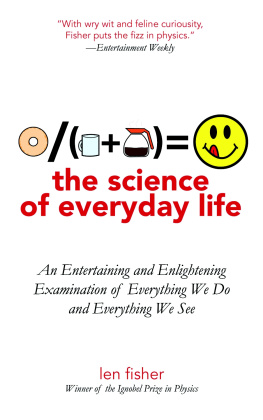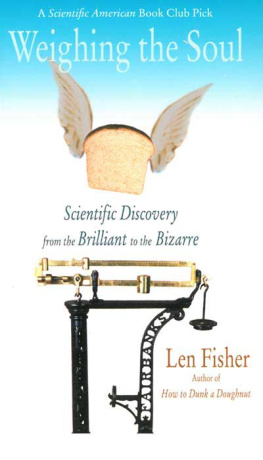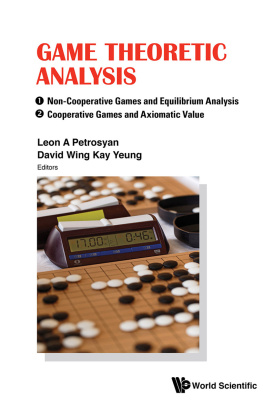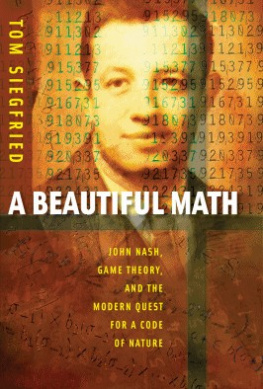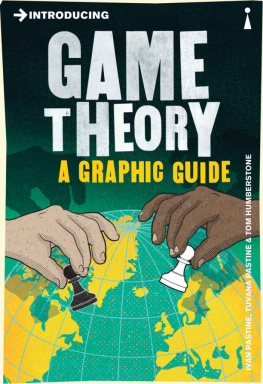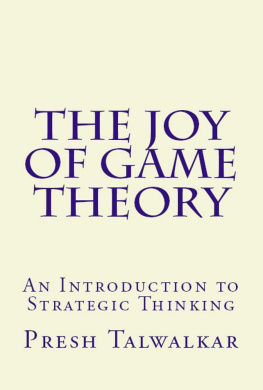Table of Contents
Praise For Rock, Paper, Scissors
Rock, Paper, Scissors brings the evolution of cooperation to everyone with a succinct summary of how these exciting ideas change the way we look at the world and the way we think.
John R. Hauser, Kirin Professor of Marketing, MIT Sloan School of Management
This is a super account of the most important unsolved problem in all of science: how did co-operative behaviour evolve, enabling complex human societies to arise and persist. Effective action to address issues such as climate change, biodiversity loss, or feeding tomorrows still-growing population depend on still better understanding of this problem. Read the book!
Lord Robert May, Zoology Department, Oxford University
In its sixty years of evolving, game theory has emerged from a mathematical phase, to a pedagogical phase, to a level of development that can be understood and useful to the intelligent reader. Len Fishers book clearly outlines the uses of game theory in everyday life in general, and in encouraging cooperative behaviour in particular. A tour de force of exposition, with many amusing and enlightening vignettes of the application of game theory to real-world interactions in the home, amongst friends, in business, and in international relations. A great introduction to several themes in recent game theory for the intelligent reader.
Professor Robert Marks, Australian Graduate School of Management
Why be nice? In answering this simple question, Len Fisher takes us on a wry, fascinating tour of one of the most momentous sciences of our time. You couldnt ask for a better guide to the games we all play.
William Poundstone, author of Gaming the Vote and Fortunes Formula
Rock, Paper, Scissors is a refreshingly informal as well as insightful account of key ideas in game theory.Len Fisher gives many examples, several from his own life, of games that pose harrowing choices for their players. He shows how game theory not only illuminates the consequences of these choices but also may help the players extricate themselves from situations likely to cause anger or grief.
Steven J. Brams, New York University, author of Mathematics and Democracy
ALSO BY LEN FISHER, PH.D
How to Dunk a Doughnut Weighing the Soul
To Wendella, who coped and encouraged magnificently throughout the development of this book, and Phil Vardy, whose constructive criticism of my first efforts was instrumental in setting me on the right track.
Acknowledgments
MANY PEOPLE HAVE HELPED ME WITH THIS PROJECT. My wife, Wendella, has been a constant source of inspiration, support, and ideas from the very start, and she has spent a great deal of time and effort in editing draft chapters and suggesting useful ways to improve them. Professor Bob Marks, from the Australian Graduate School of Management, has kindly read the whole manuscript through and offered comments and suggestions from the point of view of a professional game theorist. Dr. Adrian Flitney has done likewise for the section on quantum game theory. Many other people have proposed ideas and have read and commented on draft chapters, including (in alphabetical order) Simon Blomberg, Kathie Davies, Lloyd Davies, John Earp, David Fisher, Diana Fisher, Keith Harrison-Broninski, Virginia King, Alan Lane, John Link, Emma Mitchell, Sue Nancholas, Geoff Oldman, Clive Perrett, Harry Rothman, Al Sharp, Phil Vardy, and my whole 2007 science history tour group. Finally, I must thank my agent, Barbara Levy, who encouraged me to pursue this idea and who has never lost faith in its importance and relevance, and my New York editor, Amanda Moon, whose detailed and perceptive comments have resulted in many improvements to the original manuscript. If I have inadvertently omitted anyones name from this list, I can only apologize and hope that they will at least enjoy a drink with me the next time that I see them.
Introduction
A FRIEND CALLED ME RECENTLY with the news that a group of scientists had just published a study on how teaspoons gradually disappear from the communal areas of offices. Game theory! he screamed triumphantly. I thanked him profusely, and added yet another example to my already thick file.
Game theory is all around us. Despite its name, it is not just about gamesit is about the strategies that we use every day in our interactions with other people. My friends have been sending me examples from newspaper stories and their own personal experience ever since I announced my intention to write a book about it. I wanted to find out whether its surprising new insights could help us develop fresh strategies for cooperation, and to try them out for myself in environments that ranged from the polite confines of an English dinner party to baseball games, crowded sidewalks, shopping centers, congested Indian roads, and Australian outback pubs.
Game theory tells us what is going on behind the confrontations, broken promises, and just plain cheating that we so often see in domestic quarrels, neighborhood arguments, industrial disputes, and celebrity divorce cases. It also gives guidance to the best strategies to use in situations of competition and conflict, which is why big business and the military have taken to it like ducks to water since it was invented in the late 1940s. It provides businessmen with strategies to get the better of their competitors, and guides Western military thinking to an alarming extent. Professional game theorists have often had a foot in both camps. To give just one example, all five game theorists who have won Nobel Prizes in economics have been employed as advisors to the Pentagon at some stage in their careers.
But there is another side to game theorya side that concerns cooperation rather than confrontation, collaboration rather than competition. Biologists have used it to help understand how cooperation evolves in nature in the face of survival of the fittest. Sociologists, psychologists, and political scientists are using it to understand why we have such problems in cooperating, despite the fact that we need cooperation as never before if we are to resolve important and worrying problems like global warming, resource depletion, pollution, terrorism, and war. I wanted to see whether it could be used in everyday situations and to find out whether the lessons learned might be helpful in resolving larger-scale problems. At the least, I thought, I might discover some clues as to how we as individuals could help to resolve such problems.
Game theorists have discovered an amazing link between all of these problemsa hidden barrier to cooperation that threatens to produce untold damage unless we learn to do something about it, fast. The barrier presents us with a catch-22 logical trap that is a constant, if often unrecognized, presence in family arguments, neighborhood disputes, and day-to-day social interactions, as well as in the global issues that we now face. It even accounts for the way that spoons mysteriously disappear from the communal areas of offices.
The scientists who studied the problem, who were otherwise perfectly sane and respectable Australian medical epidemiologists, had a lot of fun dreaming up unlikely explanations. One was that the spoons had escaped to a planet entirely populated by spoon life-forms, there to live an idyllic existence in which they were not being dunked head-down in cups of hot tea or coffee. Another was resistentialismthe belief that inanimate objects have a natural antipathy toward humans and are forever trying to frustrate us, in this case by hiding when they are most wanted, in the manner of single socks in a washing machine.


